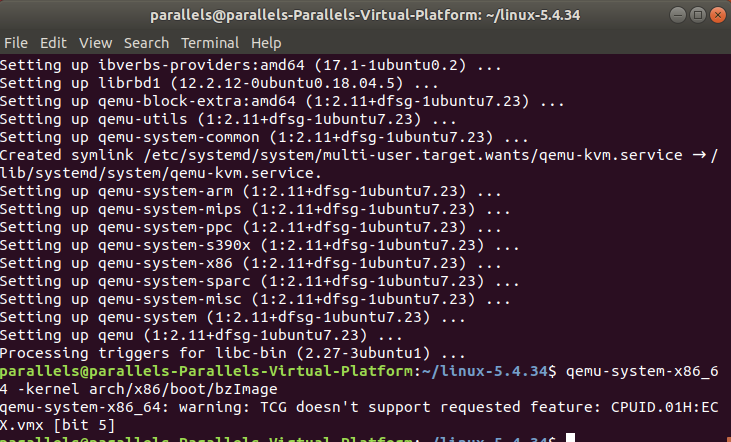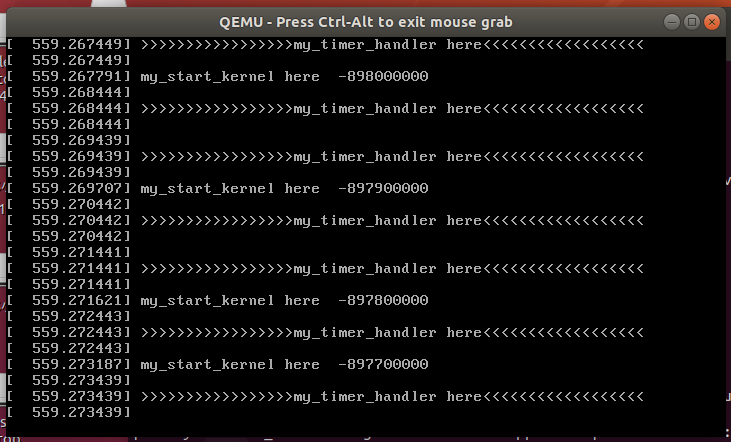基于mykernel 2.0编写一个操作系统内核
1.配置mykernel 2.0,熟悉Linux内核的编译
虚拟机环境:虚拟机Ubuntu 18.04.1 LTS amd64

打开终端,依次输入以下代码
wget https://raw.github.com/mengning/mykernel/master/mykernel-2.0_for_linux-5.4.34.patch(可以直接使用群里下好的放在桌面就可以跳过这一步) sudo apt install axel axel -n 20 https://mirrors.edge.kernel.org/pub/linux/kernel/v5.x/linux-5.4.34.tar.xz xz -d linux-5.4.34.tar.xz tar -xvf linux-5.4.34.tar cd linux-5.4.34 patch -p1 < ../mykernel-2.0_for_linux-5.4.34.patch sudo apt install build-essential libncurses-dev bison flex libssl-dev libelf-dev make defconfig # Default configuration is based on 'x86_64_defconfig' make -j$(nproc) sudo apt install qemu # install QEMU qemu-system-x86_64 -kernel arch/x86/boot/bzImage
配置成功后结果如下,从qemu窗口中您可以看到my_start_kernel在执行,同时my_timer_handler时钟中断处理程序周期性执行

2. 编写一个操作系统内核(参照-https://github.com/mengning/mykernel )
现在环境已经搭建好了,只要在mymain.c的基础上完成进程描述PCB和进程链表管理等,在myinterrupt.c的基础上完成进程切换代码,就可以完成⼀个可运⾏的OS kernel。
首先定义mypcb.h
//最大的任务数
#define MAX_TASK_NUM 4
#define KERNEL_STACK_SIZE 1024*8
/* CPU-specific state of this task */
struct Thread {
unsigned long ip;
unsigned long sp;
};
typedef struct PCB{
int pid;
volatile long state; /* -1 unrunnable, 0 runnable, >0 stopped */
char stack[KERNEL_STACK_SIZE];
/* CPU-specific state of this task */
struct Thread thread;
unsigned long task_entry;
struct PCB *next;
}tPCB;
//调度函数
void my_schedule(void);
接着修改mymain.c中的my_start_kernel函数,并在mymain.c中实现了my_process函数,用来模拟一个个进程,时间片轮转调度。
#include "mypcb.h"
tPCB task[MAX_TASK_NUM];
tPCB * my_current_task = NULL;
volatile int my_need_sched = 0;
void my_process(void);
void __init my_start_kernel(void)
{
int pid = 0;
int i;
/* Initialize process 0*/
task[pid].pid = pid;
task[pid].state = 0;/* -1 unrunnable, 0 runnable, >0 stopped */
task[pid].task_entry = task[pid].thread.ip = (unsigned long)my_process;
task[pid].thread.sp = (unsigned long)&task[pid].stack[KERNEL_STACK_SIZE-1];
task[pid].next = &task[pid];
/*fork more process */
for(i=1;i<MAX_TASK_NUM;i++)
{
memcpy(&task[i],&task[0],sizeof(tPCB));
task[i].pid = i;
task[i].state = -1;
task[i].thread.sp = (unsigned long)&task[i].stack[KERNEL_STACK_SIZE-1];
task[i].next = task[i-1].next;
task[i-1].next = &task[i];
}
/* start process 0 by task[0] */
pid = 0;
my_current_task = &task[pid];
asm volatile(
"movq %1,%%rsp\n\t" /* set task[pid].thread.sp to rsp */
"pushq %1\n\t" /* push rbp */
"pushq %0\n\t" /* push task[pid].thread.ip */
"ret\n\t" /* pop task[pid].thread.ip to rip */
:
: "c" (task[pid].thread.ip),"d" (task[pid].thread.sp) /* input c or d mean %ecx/%edx*/
);
}
void my_process(void)
{
int i = 0;
while(1)
{
i++;
if(i%10000000 == 0)
{
printk(KERN_NOTICE "this is process %d -\n",my_current_task->pid);
if(my_need_sched == 1)
{
my_need_sched = 0;
my_schedule();
}
printk(KERN_NOTICE "this is process %d +\n",my_current_task->pid);
}
}
}
3.简要分析操作系统内核核心功能及运行工作机制
这是进程切换的核心代码
asm volatile(
"pushq %%rbp\n\t" /* 1 save rbp of prev */
"movq %%rsp,%0\n\t" /* 2 save rsp of prev */
"movq %2,%%rsp\n\t" /* 3 restore rsp of next */
"movq $1f,%1\n\t" /* 4 save rip of prev */
"pushq %3\n\t" /* 5 save rip of next */
"ret\n\t" /* 6 restore rip of next */
"1:\t" /* 7 next process start here */
"popq %%rbp\n\t" /* 8 restore rbp of next */
: "=m" (prev->thread.sp),"=m" (prev->thread.ip)
: "m" (next->thread.sp),"m" (next->thread.ip)
);
}
1,2 保存的是前一个进程的rbp和rsp,rbp保存在栈中,rsp保存在pcb.sp中
3 更换了进程栈,原本rsp指向前一个进程的栈,而后指向了后一个进程的栈
4 将$1f 保存到了前一个线程的pcb.ip中(可以看做是保存当前进程的ip)
5,6 修改当前rip寄存器的值,相当于原来rip的内容为前一个进程的指令地址,现在为后一个进程的指令地址
7,8 将rbp寄存器的值修改为下一个进程的栈底




 浙公网安备 33010602011771号
浙公网安备 33010602011771号